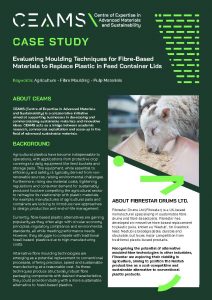CEAMS (Centre of Expertise in Advanced Materials and Sustainability) is a collaborative initiative aimed at supporting businesses in developing and commercialising sustainable materials and innovative ideas. CEAMS acts as a bridge between academic research, commercial exploitation and scale-up in the field of advanced sustainable materials.
Background
Agricultural plastics have become indispensable to operations, with applications from protective crop coverings to daily equipment like feed buckets and storage pails. This equipment, while essential to efficiency and safety, is typically derived from nonrenewable sources, raising environmental challenges. Furthermore, rising raw material costs, tightening regulations and consumer demand for sustainably produced food are compelling the agricultural sector to reimagine its relationship with plastic materials. For example, manufactures of agricultural pails and containers are looking to introduce new approaches to design, production and end-of-life management.
Currently, fibre-based plastic alternatives are gaining popularity as they often align with circular economy principles, regulatory compliance and environmental standards, all while meeting performance needs. However, they struggle to compete with traditional fossil-based plastics due to high manufacturing costs. Alternative fibre moulding technologies are emerging as a potential replacement to conventional processes, offering precision, speed and sustainable manufacturing at a reasonable cost. As these techniques produce structurally robust fibre packaging components with desired characteristics, they could provide industry with a more sustainable alternative to fossil-based plastics.
Fibrestar Drums Ltd (Fibrestar) is a UK-based manufacturer specialising in sustainable fibre drums and fibre-based pails. Fibrestar has developed an innovative fibre-based replacement to plastic pails, known as ‘Nestub’, for livestock feed. Nestub is biodegradable, durable and stackable, but faces major competition from traditional plastic-based products.
Recognising the potential of alternative moulded fibre technologies in other industries, Fibrestar are exploring their viability in agriculture, aiming to position the Nestub product line as a cost-competitive and sustainable alternative to conventional plastic products.
Project
A 7-month experimental investigation was conducted by three CEAMS Application Scientists at the Henry Royce Institute to verify pulp materials produced via the alternative fibre moulding as a replacement to plastic pails for livestock feed. A suite of imaging and characterisation methodologies were used to verify pulp-based lids supplied by Fibrestar and assess their suitability for goods containment. As the pail lids would ideally biodegrade at the end of their use period, lids were artificially aged and tested under different conditions to simulate degradation in the natural environment.
Results
The pulp-based lids successfully displayed varying levels of structural integrity loss when exposed to simulated weather conditions, indicating degradation in natural settings. A further phase of investigation is recommended to assess environmental impact of the degradation products. Future work is also expected to focus on increasing the durability of pulp-based lids to extend their lifetime in the natural environment.
Impact
CEAMS Application Scientists successfully validated the performance of alternative fibre moulded materials as a sustainable substitute for plastic in agricultural containers, using livestock feed pail lids as a representative case study.
Through the CEAMS collaboration, Fibrestar was provided with robust scientific evidence to evaluate the performance of the new material against their existing manufacturing process for Nestub, enabling the company to make informed decisions about future materials research and development innovation. The project exemplifies CEAMS’ strategic commitment to driving sustainable change in major UK sectors like agriculture through advanced materials and expert scientific process.
"The team at CEAMS quickly understood Fibrestar’s brief in performing relevant tests and analysing the new material, its purpose and understand its strengths and weaknesses against polymer based alternatives. They ensured that regular communications and updates of the testing and results were clear, understood, thorough and effective."
Fibrestar




